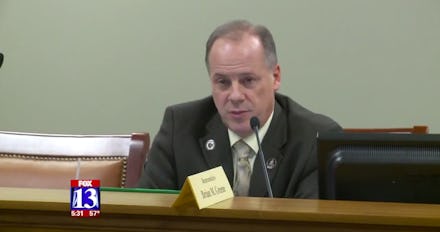This Is the New Worst Politician in America

There still seem to be some gaps in understanding when it comes to willfully and freely consenting to sexual activity.
At least, that's the takeaway from a recent debate among legislators in Utah, where a bill aims to clarify the meaning of consent in sexual assault cases. Specifically, HB74 would remove any ambiguity about sexual activity involving an unconscious or incapacitated person. But this concept encountered some resistance from at least one lawmaker who wasn't sure if that standard was overbroad.
"I'm not trying at all to justify sexual activity with an unconscious person, It's abhorrent to me," said Utah Rep. Brian Greene, KSTU-TVU reported. "It looks to me now like sex with an unconscious person is by definition rape. I hope this wouldn't happen, but this opens the door to it — a individual has sex with their wife while she is unconscious, or he, the other way around if that's possible, I don't know. But a prosecutor could then charge that spouse with rape."
Interesting.
This logic isn't just flawed, it's also absurd. Being married or part of a romantic relationship doesn't automatically imply consent or make sexual activity compulsory. In fact, sexual abuse between intimate partners remains a serious issue. According to a 2011 survey conducted by the Centers for Disease Control and Prevention, roughly 45% of female rape victims and 29% of male rape victims in the United States were raped by a current or former intimate partner. And per estimates from the Rape, Abuse and Incest National Network, as many as 68% of rapes never get reported for a variety of reasons.
This isn't about overreaching, this is about accountability. The bill's sponsor, Rep. Angela Romero, told KSTU the change was needed because the wording of the current law may be allowing some perpetrators to escape prosecution. "At the end of the day, when we took out that language, if somebody is unconscious, you probably shouldn't attempt to try to have sexual relations with them," she told reporters.
Ultimately, the bill managed to make it out of committee, Greene's original ignorance not withstanding, as lawmakers were able to overcome their reservations and return to their senses. But the fact that there was any initial confusion at all is indicative of a much larger cultural problem, in which the definition of consent continues to remain gray, even in the minds of our nation's lawmakers. Not surprisingly, more often than not, the politicians who don't seem to get it end up having one thing in common — they're men.
But this ignorance has far-reaching consequences: Not only does it potentially make rape harder to prosecute, it means victims too often are forced to prove their own rape happened, carrying a heavy burden in the aftermath. Utah may have dodged a bullet Tuesday, but the absurdity of this most recent incident serves to highlight how far we still have to go, both from a political and cultural standpoint, when it comes to the way we understand and talk about non-consensual sexual encounters.
h/t ThinkProgress